Realising Just Cities – Successful 3rd Annual Conference in Cape Town
Mistra Urban Futures third annual conference convened in Cape Town 5-7 November 2018. Almost 200 delegates from 11 countries and 5 continents gathered to learn, network and move forward in the ambition to Realise Just Cities. It was a key opportunity for the international comparative projects to meet and work together as well as connecting to the ever-growing international network that the Centre makes up.
All active within Mistra Urban Futures was warmly welcomed to Cape Town with an informal reception at the Two Oceans Aquarium. Acting African Centre for Cities Director Andrew Tucker and Mistra Urban Futures Director David Simon welcomed all delegates. African Centre for Cities is the local host for the Cape Town platform.
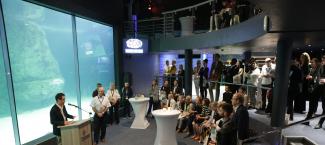
Key notes – perspectives from government and universities
Andries Nel, Deputy Minister of Cooperative Governance and Traditional Affairs, South Africa commenced his keynote address by quoting South Africa’s President Ramaphosa;
“The urban spatial patterns that we inherited from apartheid, and which persist to this day, contribute to the reproduction of poverty and inequality – and must be fundamentally changed. It is unacceptable that the working class and poor, who are overwhelmingly black, are located far from work opportunities and amenities. Among other things, this places enormous pressure on family life. Working parents leave home early and return well after young children are, or should be, asleep. These long commuting times impact disproportionately on the household income of the poor.”
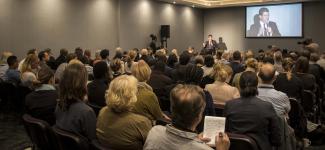
Andries Nel pointed out that President Ramaphosa was articulating South Africa’s commitment to just cities through the radical social and economic transformation of our urban spaces. The quote also captures some of the aspects of Realising Just Cities – the theme of the conference and Mistra Urban Futures research agenda 2015-2019. Find Andries Nel’s speech here.
Video-clip:
“Cities cannot succeed without the energy and investment of their citizens. In fact, the very power of cities stems from their unique capacity to bring together a critical mass of social and cultural diversity." Andries Nel continued. The Minister for Urbanisation, Town and Country Planning and Housing Sarveen Chaudhary, of Shimla, Himachal Pradesh, India gave an Indian perspective on the implementation of the New Urban Agenda and the Sustainable Urban Development Goals
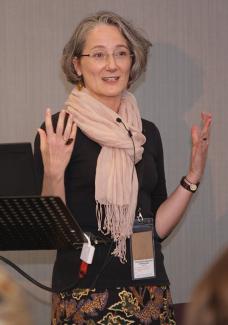
The future of universities: can we re-imagine ourselves? That thought-provoking question was raised by Olivia Bina, principal researcher at the Institute of Social Science at the University of Lisbon, and adjunct assistant professor in the Department of Geography and Resource Management at the Chinese University of Hong Kong and Board member Mistra Urban Futures, in her keynote address. It is time for universities to become an active part of the solution to achieving a sustainable future. Trust and humility are both rare qualities but crucial for the transformation of universities and of knowledge itself, Olivia Bina stated. She also outlined six steps that universities need to take; question & expose, max leverage, transformation, whole system change, role/function and a place to envision. The University of Cape Town News covered the keynote address in the article Universities must ‘reframe’ goals and agendas.
Sessions showed different aspects of Realising Just Cities
The focus of this year’s conference was Comparative Co-production and the conference shared and reflected on a selection of the comparative projects that have been co-produced in Mistra Urban Futures in different parallel sessions on’: Cultural Heritage and Just Cities; Knowledge Transfer through embedded research; Migration and Urban Development; Participatory Cities; Solid Waste Management; Sustainable Development Goals; Transportation and Urban Development; Urban Food Value Chain and Urban Public Finance.
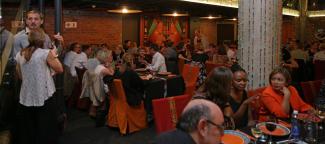
Exploring Cape Town
Site visits were an integrated part of the conference programme. The visits gave the delegates on-the-ground insight into and experience of how the research themes of the comparative projects manifest in the City of Cape Town. The delegates explored six different sites including Spatial Transformation in the Voortrekker Road Corridor Integration Zone, one of the City of Cape Town’s three spatial integration zones. The Philippi Horticultural Area, an area of over 3000 hectares agricultural land, encircled by the City of Cape Town, which is highly contested. The Epping Fresh Produce Market and the Bellville Public Transport Interchange gave a lens to the complexity of Cape Town’s food system.
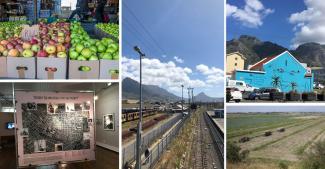
Transit-Oriented Development in Cape Town was discussed by visiting the Maitland Station. A walk through District 6 gave the delegates insight to urban trade-offs and tensions as the area has a thriving art and design market on the one hand, and culture-based gentrification on the other. The final site visit went to Sea Point, a neighbourhood where contestations over municipal owned spaces as parks, greens spaces and residential and business stock have become apparent. It is a site of socio-spatial and cultural struggle.
Book launch
One of the evenings saw the official launch of the book Tomatoes & Taxi Ranks, written by Leonie Joubert with the Consuming Urban Poverty team and photographs by Samantha Reinders, with Masixole Feni. The Urban Food Systems Governance and Poverty in African Cities edited by Jane Battersby and Vanessa Watson forms the academic foundation for Tomatoes & Taxi Ranks, download the books here. Another book presented was Urban Planet edited amongst others by Centre Director David Simon, download Urban Planet here. Tim May, Director of Research, Sheffield Methods Institute and part of the Sheffield-Manchester Platfrom team presented three books; Cities and the Knowledge Economy: Promise, Politics and Possibilities, Reflexivity: The Essential Guide and the to be published Thinking Sociologically (3rd ed).
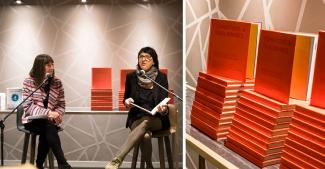
Handing over to Sheffield-Manchester
Nayoka Martinez-Bäckström, Urban Development Specialist and global programs manager, at Sida, the Swedish International Development Cooperation Agency, gave words of encouragement as the conference wrapped up, she stated that there is a clear progression of the work from the first conference in 2016 and emphasized the need for producing real change and impact on the ground in the cities we work. May it continue!
The conference ended with a handover to next year’s host, the Sheffield-Manchester platform. The conference will take place mid-October 2019 and is the fourth conference on the theme of Realising Just Cities. In 2016 the conference was hosted in Gothenburg and in 2017 in Kisumu.
Read more about the 2018 conference Realising Just Cities: Comparative Co-production
Conference coverage
Taking food security to a wider audience
Universities must ‘reframe’ goals and agendas
Deputy Minister AndriesNel: MISTRA Urban Futures Conference (African News Wire)
Deputy Minister Andries Nel: MISTRA Urban Futures Conference (South African Government)
Deputy Minister Nel to Deliver a Keynote Lecture at the 3rd Annual Mistra Urban Futures Conference
Realising Just Cities, Cape Town - Take aways from the conference
SDGs project Cross-city learning in Cape Town
Mistra Urban Futures Conference 2018, Cape Town
For social media coverage, search #JustCities2018